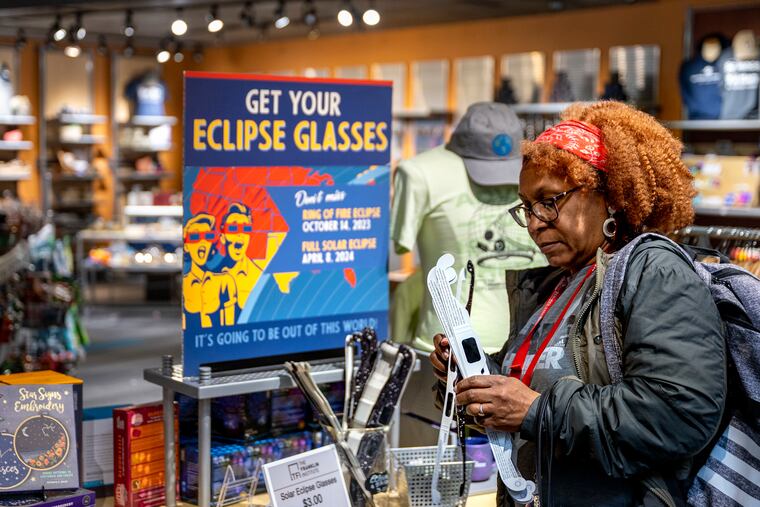How to look at Monday’s solar eclipse without harming your eyes
Tips from a NASA scientist and a local retina expert on how to safely view the eclipse.

Viewing a solar eclipse can be a spectacular, life-changing experience. It can also permanently burn your eyes — if you’re not gazing to the skies with proper protection.
In places such as Philadelphia, Monday’s eclipse will be visible, but the sun will be only partially covered by the moon. That makes it imperative that eclipse-watchers view this astronomical phenomenon only through special glasses to avoid long-term eye damage, experts say. And, no, your regular pair of sunglasses won’t cut it.
Here are tips from a NASA scientist and a local retina expert on how to safely view the eclipse:
What can I expect to see on Monday in Philadelphia?
Philadelphia isn’t the most ideal spot to watch the solar eclipse in Pennsylvania — that would be Erie, smack-dab in the path of totality, where thousands of astronomically inclined tourists are flocking to watch the moon completely block the sun.
In the path of totality, it will be possible to look at the eclipse without eye protection — but only during the three to four minutes when the sun’s rays are completely blocked, said Nicholas Lang, a NASA scientist who is coordinating the agency’s engagement efforts in Erie this week.
Here in Philly, we might see about 85% to 90% of the sun covered, Lang said, and viewers should not look at the eclipse at all without special eye protection.
Why are eclipses dangerous for my eyes?
Staring directly at the sun’s rays in any capacity can burn your retinas, said Sunir Garg, a physician who co-directs the retina research program at Wills Eye Hospital. Think of the eye as being like a magnifying glass, he said: “When the light ray comes into the eye, the cornea and the lens at the front of the eye focus light on the macula,” which is the part of the retina responsible for clear vision when we’re looking straight ahead.
“Lots of people have used a magnifying glass to create a fine point of light and set leaves on fire,” Garg said. “The sun’s rays and heat energy can get concentrated on the macula and can create, functionally, a burn.”
The sun is normally bright enough to deter most people from staring directly at it. During eclipses, the sun is easier to look at for a longer period of time because it’s partially covered, Garg said. “That additional length of time can give these light rays a chance to damage the macula,” he said.
What eye protection should I use to safely observe the eclipse?
Look for glasses whose specs include this number: ISO 12312-2. That’s the code that the International Organization for Standardization, which sets technical standards for manufactured items around the world, has designated for glasses that are dark enough for eclipse viewing. The American Astronomical Society has a handy list of vendors that the society has vetted to be sure they are selling eclipse-safe glasses.
Eclipse-safe glasses are more opaque than standard sunglasses. “They’re so dark that if I tried to walk around in my house with them on, I can’t see my kitchen lights and I can’t see the headlights of my car,” Garg said.
Some people might consider watching the eclipse through a welding mask, which is also darker than typical sunglasses. But those masks should be used only if they meet the ISO 12312-2 standard, Lang said. And don’t try to watch through a camera, or through your phone screen, without protection over the camera’s lens. “That’s going to damage or fry your lens,” Lang said.
For those who don’t want to buy eclipse glasses, local astronomical societies often allow people to view eclipses through a telescope fitted with the proper protective lenses, Garg said.
And you can watch the eclipse indirectly with a DIY trick: “Take an index card and poke a bunch of small holes in it,” Garg said. Then, hold the card a foot or two off the ground and stare at the ground — not the sky. You’ll see the moon’s shadow cross the pinpoints of light that filter through the card.
But he cautioned: “It’s not as fun. There’s really nothing as cool as looking up at the skies, so make sure you have the appropriate protective gear.”
Once I have eye protection, where should I watch the eclipse in Philly?
Lang recommends finding a clear view to the southwest, unobstructed by buildings and trees, and to make sure you’re safe. Don’t try to watch in the middle of the road or while driving.
“It’s an amazing celestial ballet we get to observe,” Lang said. “And people can contribute to the science of understanding eclipses — it doesn’t matter who you are or where you’re from. This is for everyone.”
I think I might have damaged my eyes looking at the eclipse. What should I do?
Warning signs of a damaged macula include trouble reading or straight lines seeming wavy or crooked, Garg said. The numbers three and eight might seem indistinguishable, or people might not be able to see all the letters in a word they’re reading. Macular scarring from staring at the sun can present as a small smudge, waviness, blurriness, or distortion in the center of your vision.
People concerned that they might have damaged their macula should speak to an eye doctor, Garg said.
“In a lot of these cases, we can’t do anything to make it better,” he said. “But we can help people understand what’s happening with their vision and give them things to look for.”
People with macular scarring will likely still have “pretty good vision,” he said, but might have trouble reading fine print and qualifying for a driver’s license.
“The best thing is to prevent these problems by getting approved protective gear,” he said.